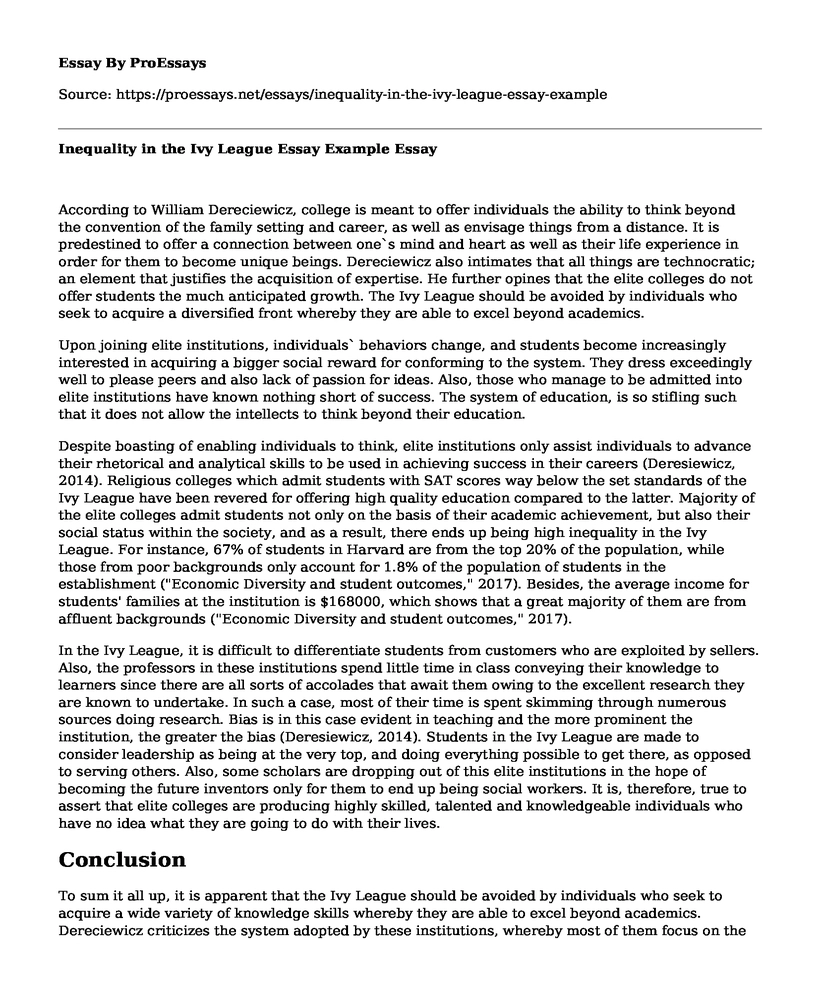According to William Dereciewicz, college is meant to offer individuals the ability to think beyond the convention of the family setting and career, as well as envisage things from a distance. It is predestined to offer a connection between one`s mind and heart as well as their life experience in order for them to become unique beings. Dereciewicz also intimates that all things are technocratic; an element that justifies the acquisition of expertise. He further opines that the elite colleges do not offer students the much anticipated growth. The Ivy League should be avoided by individuals who seek to acquire a diversified front whereby they are able to excel beyond academics.
Upon joining elite institutions, individuals` behaviors change, and students become increasingly interested in acquiring a bigger social reward for conforming to the system. They dress exceedingly well to please peers and also lack of passion for ideas. Also, those who manage to be admitted into elite institutions have known nothing short of success. The system of education, is so stifling such that it does not allow the intellects to think beyond their education.
Despite boasting of enabling individuals to think, elite institutions only assist individuals to advance their rhetorical and analytical skills to be used in achieving success in their careers (Deresiewicz, 2014). Religious colleges which admit students with SAT scores way below the set standards of the Ivy League have been revered for offering high quality education compared to the latter. Majority of the elite colleges admit students not only on the basis of their academic achievement, but also their social status within the society, and as a result, there ends up being high inequality in the Ivy League. For instance, 67% of students in Harvard are from the top 20% of the population, while those from poor backgrounds only account for 1.8% of the population of students in the establishment ("Economic Diversity and student outcomes," 2017). Besides, the average income for students' families at the institution is $168000, which shows that a great majority of them are from affluent backgrounds ("Economic Diversity and student outcomes," 2017).
In the Ivy League, it is difficult to differentiate students from customers who are exploited by sellers. Also, the professors in these institutions spend little time in class conveying their knowledge to learners since there are all sorts of accolades that await them owing to the excellent research they are known to undertake. In such a case, most of their time is spent skimming through numerous sources doing research. Bias is in this case evident in teaching and the more prominent the institution, the greater the bias (Deresiewicz, 2014). Students in the Ivy League are made to consider leadership as being at the very top, and doing everything possible to get there, as opposed to serving others. Also, some scholars are dropping out of this elite institutions in the hope of becoming the future inventors only for them to end up being social workers. It is, therefore, true to assert that elite colleges are producing highly skilled, talented and knowledgeable individuals who have no idea what they are going to do with their lives.
Conclusion
To sum it all up, it is apparent that the Ivy League should be avoided by individuals who seek to acquire a wide variety of knowledge skills whereby they are able to excel beyond academics. Dereciewicz criticizes the system adopted by these institutions, whereby most of them focus on the monetary consideration that comes with admitting students from affluent backgrounds. Besides, the idea that they center their focus on many unwarranted issues besides academics is a prime concern that ought to be taken into consideration by individuals seeking to acquire a vast variety of knowledge and skills. Also, those who attend such institutions, end up being forced to adapt to the system in a bid to attain the much coveted social reward. In future, it would be advisable to do further research on the students who end up attending less prestigious institutions, and their success in life.
References
Deresiewicz, W. (2014). Don`t Send Your Kid to the Ivy League: The nation`s top colleges are turning our kids into zombies. Retrieved from https://newrepublic.com/article/118747/ivy-league-schools-are-overrated-send-your-kids-elsewhere
Economic Diversity and student outcomes at Harvard University. (2017, Jan 18). The New York Times. Retrieved from https://www.nytimes.com/interactive/projects/college-mobility/harvard-university
Cite this page
Inequality in the Ivy League Essay Example. (2022, Sep 13). Retrieved from https://proessays.net/essays/inequality-in-the-ivy-league-essay-example
If you are the original author of this essay and no longer wish to have it published on the ProEssays website, please click below to request its removal:
- Digital Resources for Learning English Analysis Paper Example
- Direct TV Advert Paper Example
- Essay Example on a College Student's Struggle With Early Risers
- Essay Sample on Bullying in the Workplace: Recognizing the Subtle Signs
- Essay Sample on Language Environment: Impact on Child Development
- Essay Example on Immigration: Pros and Cons in the Modern World
- Free Essay Example: Young People Need Fulfillment of Basic Needs in Classroom







